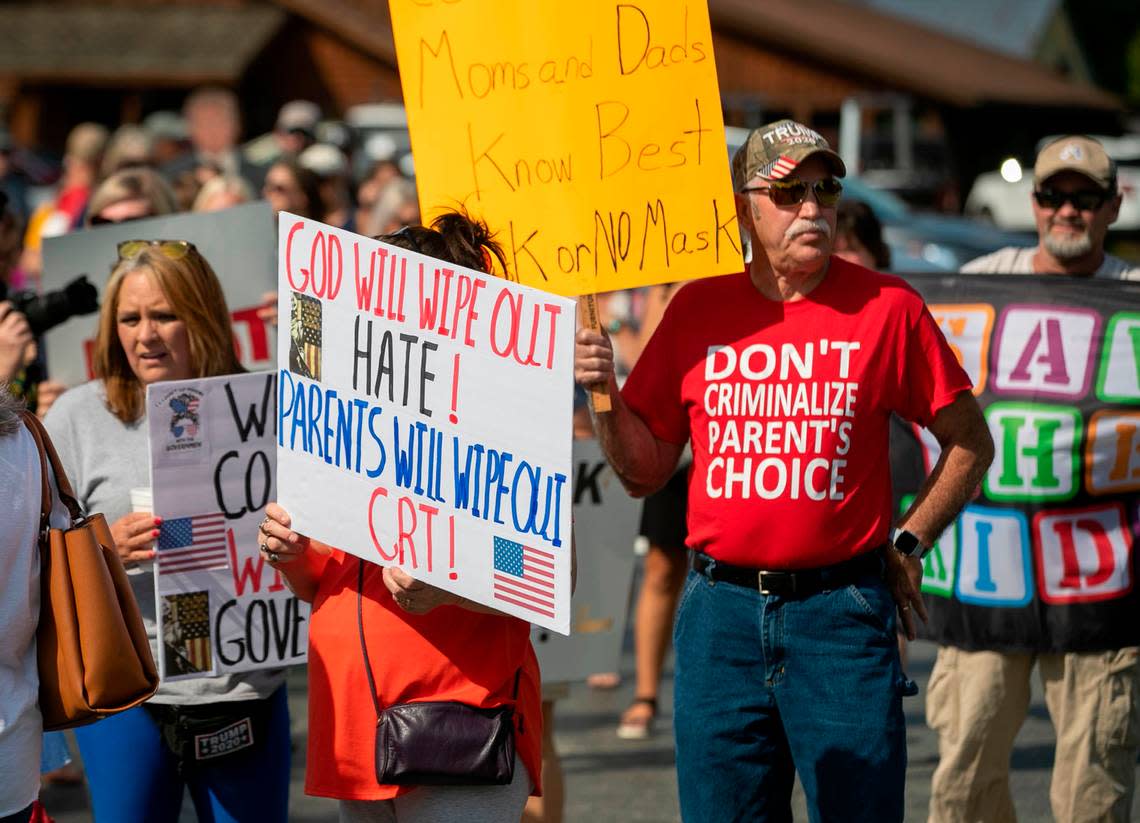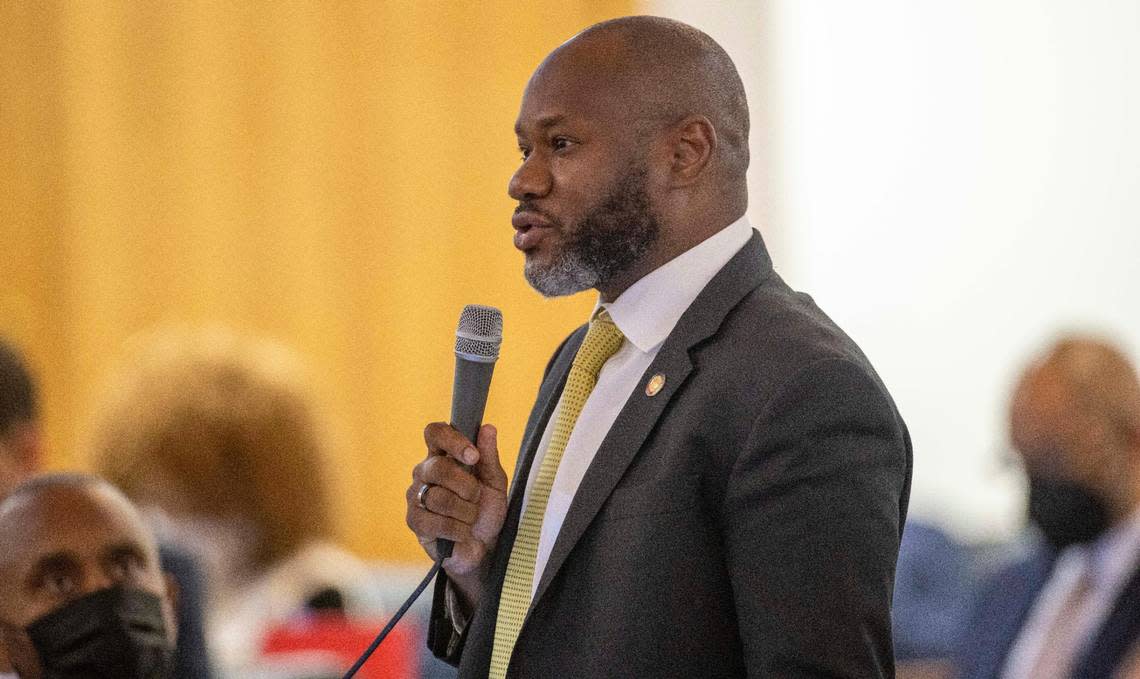NC House GOP revives anti-CRT bill, saying it will promote ‘equality in education’
North Carolina Republican lawmakers are reviving an effort to pass an anti-Critical Race Theory bill that was vetoed in 2021 by Democratic Gov. Roy Cooper.
House Bill 187, titled “Equality in Education,” was filed on Thursday and says public schools can’t “promote” concepts such as the idea that “one race or sex is inherently superior to another race or sex” or that “an individual, solely by virtue of his or her race or sex, is inherently racist, sexist or oppressive.”
It also says teachers shall not promote that anyone “should feel discomfort, guilt, anguish or any other form of psychological distress” based on their race or sex.
In election campaigns and legislative efforts, Republicans nationwide and in North Carolina have focused on what they describe as protecting parents’ rights and preventing school indoctrination of students, and what opponents criticize as censorship. North Carolina Republicans have also proposed a law known as the Parents’ Bill of Rights targeting instruction in elementary grades on explicit material and LGBTQ issues. The state Senate approved that bill this year, but it has not been taken up by the House.
Since January 2021, 44 states have introduced bills or taken other steps that would restrict teaching critical race theory or limit how teachers can discuss racism and sexism, according to an Education Week analysis. Eighteen states have imposed these bans and restrictions either through legislation or other avenues.

The debate over critical race theory
Republican lawmakers have introduced bills at the national and state level targeting what they call Critical Race Theory, which holds that racism has been a systemic part of the nation’s history that still influences society today.
Conservative groups have accused schools of promoting Critical Race Theory. School leaders have denied the charge, saying that anything involving the discussion of diversity, equity and race has been conflated to be about Critical Race Theory.
A bill with nearly identical language to the one introduced Thursday passed both the House and Senate in 2021 along party lines, with all Republicans in favor and all Democrats against it. All African American lawmakers voted against the bill.
When Cooper vetoed the bill, he said it “pushes calculated, conspiracy-laden politics into public education.”
This year though, Republicans have enough votes in the Senate to override Cooper and are only one vote short in the House.
House Speaker Tim Moore told reporters on Thursday that he wants “to make sure that when children are in schools, they’re there to learn, they’re not there to be indoctrinated. They’re not there to be put down or treated badly. And so this system is designed to ensure that doesn’t happen.”
“And then also, maybe even more importantly, is to guarantee the transparency to parents to know what’s being taught and to have an opportunity to have a say-so in their child’s education,” Moore said.
What’s in the bill
The legislation, which does not include the phrase “Critical Race Theory,” would also require schools to post online ahead of time whenever schools provide instruction related to the prohibited concepts. They’d also have to list when they hire speakers, consultants or diversity trainers who discuss those concepts or have previously advocated those concepts.
Moore said that “Critical Race Theory” as a term is what’s “talked about out there in the lexicon, but it’s basically anything that’s trying to teach — that’s trying to differentiate and separate and pit groups of people against each other. ... Some of the most extreme that’s out there that got parents worked up, was where they were singling out various children and saying that because of how you look, because of your religious beliefs, you’ve somehow been entitled to more in life than someone else, and trying to make them feel bad about themselves. Why do we need to do that?”
Language in the bills, which Moore said was worked on by several House members, also bans teaching that:
▪ “An individual, solely by virtue of his or her race or sex, bears responsibility for actions committed in the past by other members of the same race or sex;
▪ A meritocracy is inherently racist or sexist;
▪ The United States was created by members of a particular race or sex for the purpose of oppressing members of another race or sex.”
Moore said that “we need to have a very frank and candid and honest discussion about the history of our state, the history of our country. There’s been some bad, sad chapters in our nation’s history of where people were discriminated against, people were enslaved. Those things need to be talked about. And we need to talk about those bad parts of history, because people need to understand that that’s how bad and how evil things can be if you allow it to happen.”
February is Black History Month. Asked what he would tell Black parents about the bill that regulates how race is taught, Moore said he thinks that “anyone who cares at all about the racial history of this country, and who is concerned about making sure there is racial justice, ought to be against some of this extreme curriculum that’s being pushed out there, that is only trying to further divide students, and trying to further divide people.”
Moore said one of the reasons the United States is a great nation is because of “the diversity of the people who live here, the stories they have, the background they have ... So I think you want to strengthen that, I don’t think you want to take that and try to Balkanize or try to split people off in different groups. And certainly it’s not appropriate for schoolchildren, in a setting where they’re there to learn, to be taught or indoctrinated in any kind of political ideology, right or left.”
The bill is not expected to be fast-tracked, as Moore said it will not come to the floor for a vote next week.
But Tamika Walker Kelly, president of the North Carolina Association of Educators, called it an “anti-truth bill” that attempts “to limit honest and sometimes uncomfortable teaching of history.”
“Instead of focusing on supporting public schools with resources & making plans to alleviate the educator shortage, they have brought this back,” Walker Kelly tweeted Thursday. “NC students & families should have the freedom to learn truth. This copycat legislation has no place in North Carolina.”
Democratic opposition
State Rep. Amos Quick, a Guilford County Democrat, voted against the bill in 2021.
“History is not beautiful, all the time,” Quick, who is African American, told The N&O last week. “History is history, things happen. And an accurate and complete telling of the history of this nation, I think would only help students and help our society to understand where we have been, and where where we have come from.”
Quick said that “we need to learn the story of African Americans being able to overcome being brought here and enslaved for long periods of time. We need to learn about these things and how we have progressed as a society. And I think trying to shut down any telling of the actual American history is detrimental to our students, and to our society, because we don’t get a complete picture of who people are, where they’ve come from, and how they’ve contributed.
Quick said he would be against the bill, “because it seems like we’re cutting and pasting history where you can teach this, but you can’t teach that.”

State Rep. Vernetta Alston, who also opposed the 2021 bill, told The N&O this month that legislation like this “is dangerous” and called it a political distraction.
“Our children, our students, deserve to know the truth about our history,” said Alston, a Durham Democrat.
“This is something that’s being manufactured by the Republican Party, and it’s going to have real consequences for our children, for our teachers, for our schools at a time when we should be talking about the fact that I think teacher vacancies have tripled in the last three years. ... There are real crises going on in our schools that need immediate attention. And this is not where we should be spending our energy,” she said.
For more North Carolina government and politics news, subscribe to the Under the Dome politics newsletter from The News & Observer and the NC Insider and follow our weekly Under the Dome podcast at campsite.bio/underthedome or wherever you get your podcasts.
